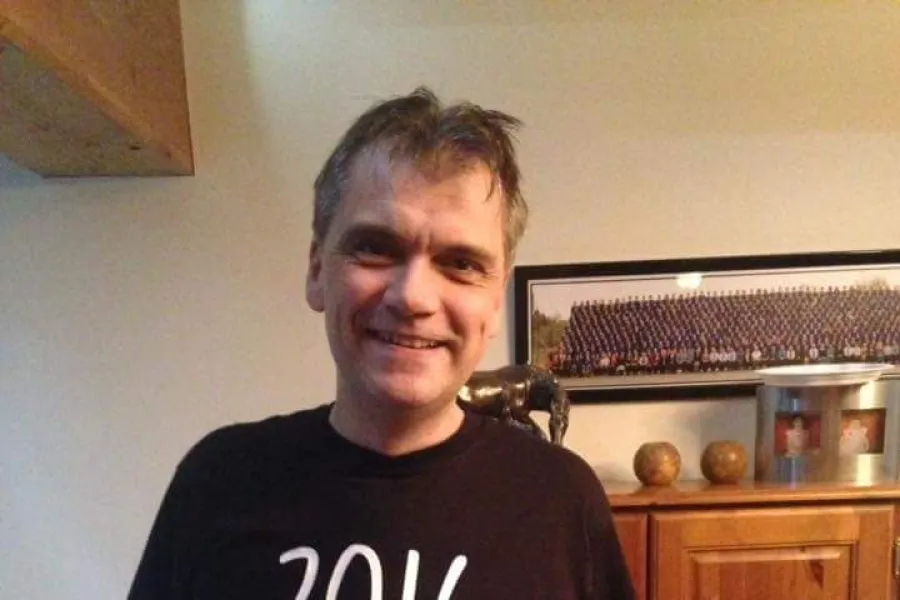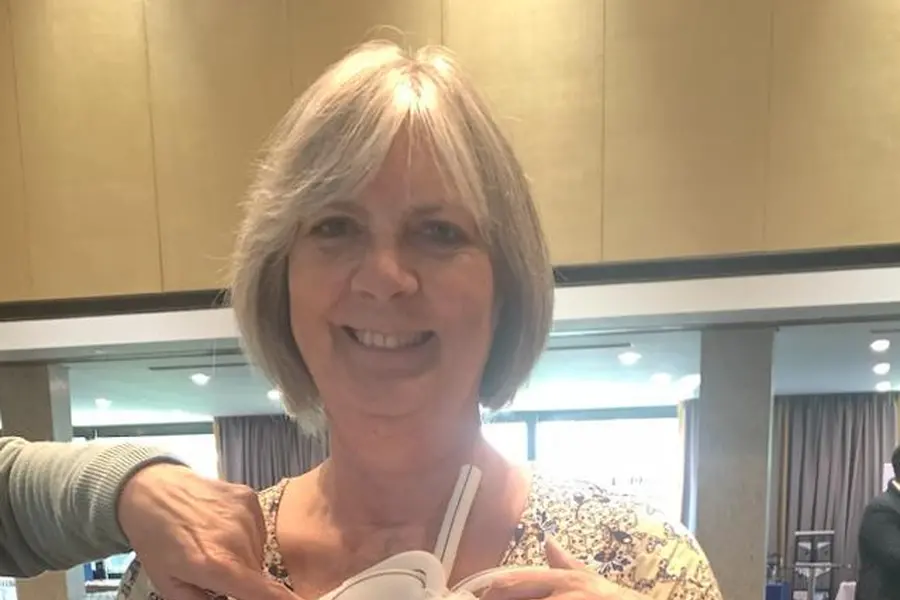Andrew's Type A aortic dissection patient story
Andrew Stevenson was Director of Research & Enterprise at the University of Lincoln when he suffered an acute Type A Aortic Dissection at the age of 47.

Andrew was 47 years old, 6ft 2in tall, fit and healthy. He was the Director of Research and Enterprise at the University of Lincoln and a key figure in the successful bid to Government for funding of the new Medical School. His son Fred was nine years old. Fred was the light in Andrew’s life, it was a joy to see them together. On December 12th 2020 Andrew left his partner Stephanie and son at around 7.45am to go on his daily bike ride. While cycling, Andrew experienced severe pain in the centre of his chest and severe cramp in his right leg from his buttock to his toes. The pain in his leg was so severe he came off his bike and could not reach his phone. His tracker showed he was at side of the road for an hour. A lady from the village helped Andrew find his phone and he called his next-door neighbour Steve, a policeman with some medical training, to come and collect him. Steve managed to get Andrew into his car with his bike and take him home. Andrew was shaken, the chest pains had subsided but his leg was still hurting. He was very cold and wet from lying on the grass. He was given a hot bath and some liquid rehydration salts.
At around 11.00am Stephanie phoned 111, who advised that since Andrew did not have any chest pains she should just keep an eye on him and ring back if anything changed. Andrew began to repeat himself and complain of the bath water being cold. His parents, Terry & Glenys, who were en route, advised Stephanie to call 999, which she was doing as they arrived. Andrew was still in the bath, with a right-side facial droop, noticeably around his eye and mouth, which lasted about 10 mins. He was unable to speak and just stared. The 999 operator asked him to repeat a sentence and he did so twice without slurring his words, then he was able to talk as before. Andrew was able to wiggle his right foot, raise his right arm and grip with his right hand, but had a temporary paralysis in his left arm. He was confused over which was right and left. He could not move his left arm and had little movement in his left leg. After about 20 mins the use of his left leg returned.
Andrew’s father Terry and his partner Stephanie got him out of the bath with much difficulty. Two paramedics arrived at around 12 noon. They found his blood pressure was very low and tried to insert a cannula but were unable as his veins had collapsed. They took several ECGs which they said did not look right. He was taken to Lincoln hospital as it was the nearest.
Andrew could not walk without support and had to shuffle down the stairs on his bottom. The family knew he was trying hard not to show pain or distress for his son to see. It was now around 1pm.
Due to the COVID-19 pandemic, no-one was allowed to go with Andrew to hospital. At 13.53 he texted to say he was at the hospital. The text was a little confused. At 15.04 he left a voicemail saying he was OK and he had seen a doctor who did not seem worried, but they were going to do more tests. Shortly after, he made a video call saying he was OK. The family knew he was trying to keep upbeat because of Fred. They asked if he had been given a CT scan. He had not. Andrew also said he had fallen off the hospital trolley and a passing nurse had stopped him banging his head on the floor.
At 4pm Andrew texted a message that was confused but meant to say he just had an X-ray. His text messages were becoming muddled and not making any sense. At 5pm he telephoned to say that the doctors were not too concerned. They were doing one more set of blood tests and if these were OK he could go home. They thought it was just severe over-exertion. At approximately 7pm Andrew rang to say that the doctors were looking at discharging him. He said he still had the cramp in his right foot. The family asked Andrew what they had thought of the stroke like symptoms, but he could not remember if they had said anything. Terry drove to the hospital to collect him at around 8pm. Andrew was in A&E in a wheelchair on his own - no discharge papers, no further appointments, no advice. He was unable to walk to the car, his foot was still numb, Terry had to position the car next to him so that Andrew could swing on the car door to get in.
Andrew arrived home exhausted. The family say that they put their trust in the medical practitioners. They were very worried, but honestly believed that what they had told Andrew was right. They thought that if Andrew could get a good night’s sleep he would feel better. Andrew was unable to sleep at all, he was still very cold, still had a problem with his leg and he kept needing to go to the toilet. He had to crawl along the floor to the toilet, as he couldn’t walk. Stephanie said he was still extremely dehydrated. He was in pain all night with severe backache. However, Andrew said that he had been seen by two doctors at the hospital and that they would not have discharged him if they had been at all concerned about him. He felt sure that he would soon be feeling better.
Around 7pm the following day Andrew had a hot bath, hoping to try and relieve the back pain. As he was dressing, Stephanie made some soup. She then heard a loud gasping noise. She rushed upstairs and found Andrew had fallen backwards on the bed and had stopped breathing. Neighbours rushed for the village defibrillator and paramedics arrived, as did two Air Ambulance personnel who were nearby and had heard the call as they were driving home. They were unable to save him.
From when Andrew first arrived at the hospital with the paramedics, the problems began when the hospital staff did not read the paramedics’ notes. Apparently the doctor treating Andrew did not know how to download the paramedics’ notes! From then onwards no one picked up on his symptoms.
An imaging post mortem showed the cause of death to be Haemopericardium due to Aortic Dissection. The post mortem was held at Queen’s Medical Centre, Nottingham.
Terry, Andrew’s father, says that for the rest of his life, he will have a feeling of guilt because he did not take Andrew straight from Lincoln to QMC in Nottingham, where he knew there was a cardiac surgery unit. He keeps asking himself how Andrew could have been discharged when he was incapable of supporting himself.
There have been many tributes paid to Andrew since his death. The Vice-Chancellor said, at his funeral, that he made an enormous contribution to both the university and the region. Terry and Glenys, Andrew’s mother, are enormously proud of his achievements. He should still be with us today, as he had much more work to do for the university and for Lincoln.
Terry and Glenys joined the national patient charity’s THINK AORTA campaign in 2021 and have regularly shared Andrew’s story at THINK AORTA education events, including at Lincoln and QMC Nottingham. The learning from Andrew’s tragic death has saved many lives already. Terry and Glenys’s message for healthcare professionals is: “Just because someone presented with some signs of, say, a stroke, look at the total picture. Please THINK AORTA. Please think out of the box. By sharing Andrew’s story, we can help teach clinicians to THINK AORTA and stop this happening to anyone else. We are determined that Andrew’s life will not have been lost in vain.”


